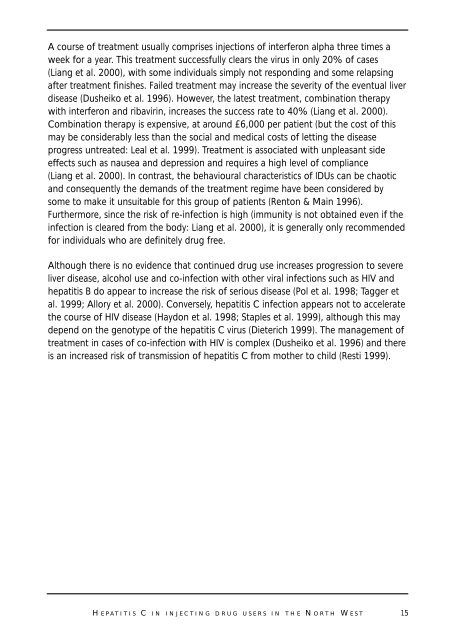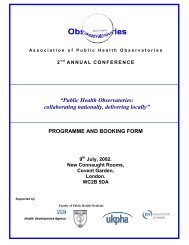9261 HEPATITIS C REPORT GALLEY - North West Public Health ...
9261 HEPATITIS C REPORT GALLEY - North West Public Health ...
9261 HEPATITIS C REPORT GALLEY - North West Public Health ...
Create successful ePaper yourself
Turn your PDF publications into a flip-book with our unique Google optimized e-Paper software.
A course of treatment usually comprises injections of interferon alpha three times a<br />
week for a year. This treatment successfully clears the virus in only 20% of cases<br />
(Liang et al. 2000), with some individuals simply not responding and some relapsing<br />
after treatment finishes. Failed treatment may increase the severity of the eventual liver<br />
disease (Dusheiko et al. 1996). However, the latest treatment, combination therapy<br />
with interferon and ribavirin, increases the success rate to 40% (Liang et al. 2000).<br />
Combination therapy is expensive, at around £6,000 per patient (but the cost of this<br />
may be considerably less than the social and medical costs of letting the disease<br />
progress untreated: Leal et al. 1999). Treatment is associated with unpleasant side<br />
effects such as nausea and depression and requires a high level of compliance<br />
(Liang et al. 2000). In contrast, the behavioural characteristics of IDUs can be chaotic<br />
and consequently the demands of the treatment regime have been considered by<br />
some to make it unsuitable for this group of patients (Renton & Main 1996).<br />
Furthermore, since the risk of re-infection is high (immunity is not obtained even if the<br />
infection is cleared from the body: Liang et al. 2000), it is generally only recommended<br />
for individuals who are definitely drug free.<br />
Although there is no evidence that continued drug use increases progression to severe<br />
liver disease, alcohol use and co-infection with other viral infections such as HIV and<br />
hepatitis B do appear to increase the risk of serious disease (Pol et al. 1998; Tagger et<br />
al. 1999; Allory et al. 2000). Conversely, hepatitis C infection appears not to accelerate<br />
the course of HIV disease (Haydon et al. 1998; Staples et al. 1999), although this may<br />
depend on the genotype of the hepatitis C virus (Dieterich 1999). The management of<br />
treatment in cases of co-infection with HIV is complex (Dusheiko et al. 1996) and there<br />
is an increased risk of transmission of hepatitis C from mother to child (Resti 1999).<br />
H EPATITIS C IN INJECTING DRUG USERS IN THE N ORTH W EST<br />
15











